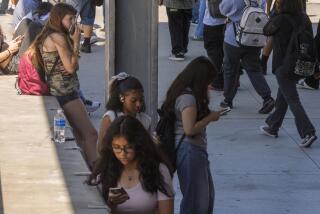Too young for status updates
- Share via
I suspect parents will greet last weekend’s report that Facebook may officially open a version of its site to preteens the same way their kids would: with an eye-rolling whatever.
After all, more than half of parents with 12-year-olds said in a recent survey that their child already has an account and most had lied about their kid’s age to help them open it. Acknowledging that reality, Facebook says, will provide a legitimate “on-ramp” that would (in addition to boosting its rolls) allow a safer, more appropriate experience for the youngest users.
Most of the controversy around children’s Internet use centers on protecting their privacy. There are strict laws limiting what online advertisers can knowingly harvest from those under 13 without parental consent. As the parent of a “tween” daughter, I’m certainly not keen to have those limits breached so she can be marketed to more efficiently. Nor am I excited by the prospect of her getting hooked on even more screen time.
But, honestly, those are not my main concerns. I worry more about the long-term impact Facebook could have on her psychological development, the way she constructs her identity — on who she is when (or, increasingly if) she turns the computer off.
The early reports, based on teens and young adults, are not comforting. In a study of college students, for instance, Adriana Manago of the Children’s Digital Media Center at UCLA found that among users of MySpace, identity was becoming increasingly externally driven: the self turning into a kind of brand crafted in response to feedback from hundreds of invisible consumers. Similarly, Sherry Turkle, a professor at MIT and author of the book “Alone Together,” writes about the “presentation anxiety” that affects young people as they craft their Facebook profiles — assembling the ideal amalgam of pictures, products, “likes.” Girls, not surprisingly, focus on physical appearance (“skinny mini” and “u r so sexxy” being typical comments on photos) sometimes creating, according to Clifford Nass, a professor of sociology at Stanford, a perfect feedback loop: The more they care about their looks, the more they check their Facebook profiles; the more they check their Facebook profiles, the more they care about their looks.
I don’t mean to demonize social media. I enjoy it. Facebook helps me stay in touch with family and friends scattered around the globe, meet people I admire, test out material with readers. Yet I am also aware of the ways it has subtly shifted my self-perception, how it encourages me to process experience as it occurs, to package my life as I live it rather than just live it. As I read at night to my daughter or stand in line at the supermarket or write this sentence, part of my consciousness splits off, viewing the scene from the outside and imagining how to distill it into a status update.
Apparently, kids are not the only ones at risk of turning the self into a performance.
Social media can feel like a series of funhouse mirrors, both forging and undermining greater intimacy, sometimes simultaneously. As an adult, I’m willing to be a guinea pig in that experiment, to see where it takes me. I’m not, however, willing to put my child in the same position.
So regardless of how they spin it, of how they try to entice her, my daughter will be staying off Facebook as long as possible, keeping it strictly face to face.
Peggy Orenstein is the author, most recently, of “Cinderella Ate My Daughter: Dispatches from the New Girlie-Girl Culture.”
More to Read
A cure for the common opinion
Get thought-provoking perspectives with our weekly newsletter.
You may occasionally receive promotional content from the Los Angeles Times.






